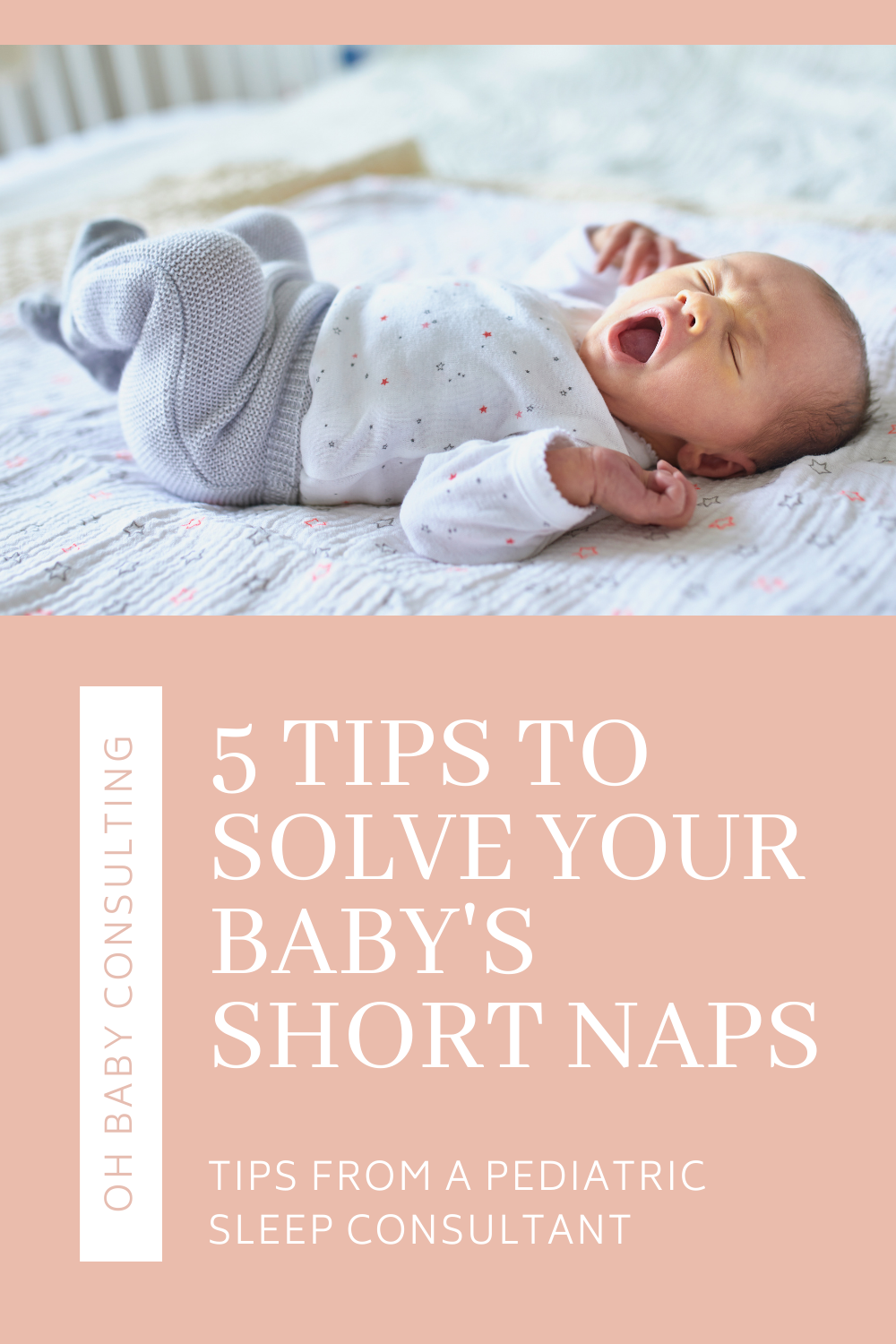5 Tips to Solve Your Baby’s Short Naps
If you’re a parent dealing with a chronic short napper, I’m sure you’ve scoured the blogs, dug into the comments of FB groups, and maybe even asked every mom-friend you know about how the heck to lengthen your baby’s naps. Short naps can be an incredibly confusing and frustrating sticky spot for many babies (and their parents) so I want to offer 5 tips to help you troubleshoot and solve the curse of the short nap.
First: What is a short nap?
Before we dive into the tips, it can be helpful to know what constitutes a short nap. A general rule of thumb is that naps are at least 1 hour. However, there are definitely exceptions to that “rule”.
- If you have a newborn or baby under 5-6 months, it can be very developmentally normal for naps to be under 1 hour. In fact, in the newborn stage even 20-minute naps are considered normal.
- If your baby is taking 3-4 naps/day, it can be normal for the later naps to be cat naps that only last 20-40 minutes.
- If you have a toddler who is only napping once a day, 1 hour might not be enough. A short nap may be considered anything under 1.5 hours.
Here are 5 tips you can use to help your baby lengthen their naps:
1. Make the room pitch black dark
Assessing light is the first thing I look at when I’m helping families with chronic cat nappers. If after you’ve closed the blinds & shut out the lights you can still see your hand in front of your face, it’s not dark enough.
This is an important first step because light is very stimulating to your baby’s brain and body. They can even register light through their closed eyelids! If your child is coming to the end of one 30–45-minute sleep cycle and their body is considering whether to transition into the next to lengthen the nap, it is going to be much more likely to keep on sleeping if there is no light to be found. Darkness for sleep will always be superior.
If you’re looking for more information on why darkness is important & tips for blackout solutions, check out this blog.
2. Use a white noise machine
Having a white noise machine that plays constantly is hugely important to quality sleep at nap time. During the day, there is likely more hustle and bustle both inside and outside of the house than there is at night. The noise dampening/canceling that accompanies a white noise machine is so important to keep your baby sleeping soundly and avoid them being disrupted by normal daily sounds.
I would avoid lullabies or music which can be stimulating to the brain and stick with true white or pink noise. This type of noise is least stimulating to the brain, and the consistency in tone & rhythm will ensure that your child doesn’t wake up during “dead space” when the track changes.
Looking for a white noise machine? Here are my favorites:
[I independently source and vet any products that I choose to share on my site. If you buy from the links I’ve provided, I may receive a small commission, which in turn supports my work.]
3. Follow an age-appropriate schedule
Making sure that your baby is on an age-appropriate schedule is also helping in ensuring naps aren’t chronically short. If your baby is overtired or not tired enough, they are more likely to struggle with short naps.
If your baby is overtired, their body will naturally produce stimulating hormones to keep them wired and awake. With these hormones surging through their body, they are going to have a harder time both falling asleep and sleeping for a nice long time. It’s kind of like trying to sleep when you’ve just had a giant cup of coffee!
On the flip side, when your baby is under tired, they may be tired enough to fall asleep initially but not tired enough to string together multiple sleep cycles to take a quality nap.
If you’re struggling to nail away times or to come up with a good schedule for your baby, let me help create one for you!
4. Avoid sleep props & encourage sleep independence
This tip is probably the most important of the five & the heart of the short-nap struggle: we need to make sure your baby is falling asleep independently and is not relying on any external sleep props to get themselves to sleep at the beginning of nap time. This is critical because if something specific was present at the onset of nap time but is missing after they complete one sleep cycle, they are more likely to wake up fully in search of that person, thing, or activity. (This is why your baby may only nap for 30 minutes in her crib after you’ve rocked her to sleep but will stay sleeping on your chest for 2+ hours!)
Once babies are falling asleep independently at the beginning of nap time, after they complete one sleep cycle (usually about 30-45 minutes) not only are they not “missing” anything, but they have the tools and skills to link into their next sleep cycle and keep on sleeping until their body is rested enough to be awake.
If you’re looking for more information on why sleep props can be problematic & independent sleep is important, you can check out the blogs linked below.
5. Check their expectations
Look at what you’re doing when your baby wakes from a short nap. Are you rushing in there quickly to help them back to sleep? Are you getting them up with a bottle and a cuddle? These things can be reinforcing to your child to both wake up early in anticipation of something, but also to assume that they need assistance transitioning from one sleep cycle to the next. Especially if you are working on sleep independence, you’ll want to give your little one a few minutes to see if they’re able to get themselves back to sleep after a short nap.
If you’re running into trouble applying these suggestions or would like some nap help, download my Nap Guide or, if you’re having most trouble with #4, schedule a sleep evaluation call to explore whether 1:1 sleep coaching is a good fit for your family.
If you’re exhausted, totally overwhelmed by your child’s sleep habits, or looking for answers to the sleep questions that keep you up at night (literally), then you’ve come to the right place. I’m Jamie, founder of Oh Baby Consulting, and my goal is to help your family get the sleep you need to not just survive, but thrive!

